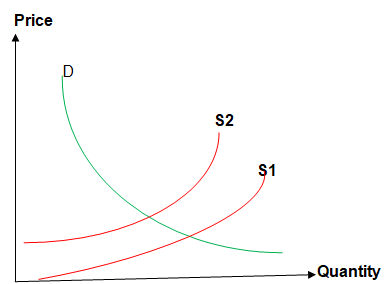In 2009 the administration of Barack Obama imposed higher tariffs on the imports of tires from China. To a large extent, this decision can be viewed as the policy of protectionist since it aims to shield domestic manufacturers from foreign competition.
This paper will discuss the effects of such government intervention into the market; in particular, we will speak about the relation between demand and supply. Overall, it is possible to argue that this decision will have a strong impact on the consumers, who would have to pay higher price for the product.
It should be noted that in 2008 Chinese manufacturers represented approximately 17 per cent of the tire industry in the United States (Shedlock, unpaged). The new 35% tariffs forced many of them out of the market. Consequently, the quantity of products, available to US consumers has diminished. It would be better to illustrate these changes with the help of supply and demand curves.

This chart shows that the supply of tires diminished while the demand for the product remained at the same level. The only possible outcome of these changes is the increase of prices. The key issue is that after the introduction of higher tariffs, the performance of domestic tire-manufactures did not improve; in fact, they produced the same amount of tires, approximately 136 million as in 2008 (Shedlock, unpaged).
The only difference is that now Chinese firms cannot compete with American producers on equal terms. This evidence indicates that poor performance of the US tire industry can be explained not only by the strong Chinese presence. The origins of this decline should be sought in the crisis that engulfed the entire automotive industry, including tire manufacturers.
It should be born in mind that not all representatives of the US tire industry support this decision of the Obama administration. Some of them believe that these tariffs will harm a great number of people, who work in this industry, for example, shop owners, technicians, wholesalers, dockworkers and so forth (Tire Industry Association, unpaged).
As a matter of fact, it is hypothesized that this government intervention into the market may result in the loss of 25,000 US jobs. As we can see, this is one of those cases, when the policies of protectionism can backfire. Besides, one should take it into account that the United States exports a great number of products to China; namely, we need to mention agricultural goods (Shedlock, unpaged).
Thus, if Chinese government decides to respond to the US policies in a similar way, many American farmers will sustain great losses in revenue. Apart from that, some American manufacturers such Boeing may also suffer from this policy, provided that the Chinese customers of this company choose to work with a different supplier.
Initially, Barack Obama’ decision to levy higher tariffs was supposed to preserve approximately 5.000 jobs for American workers. However, the potential drawbacks of this policy far outweigh its benefits. First of all, it can lead to the advance in prices for the product.
Secondly, it will harm those people, who help to transport and distribute tires to the customers. Thirdly, this protectionist policy may strain the US trade relations with China, which may produce adverse effects on many American enterprises, especially farmers.
Works Cited
Shedlock, Mike. “Obama Risks Global Trade War with Misguided Tariffs”. MISH Global Economic Trade Analysis. 2010. Web.
Tire Industry Association. “Tire Industry Association Expresses Disappointment With President’s Decision Concerning Chinese Tire Tariff” 2009. Web.